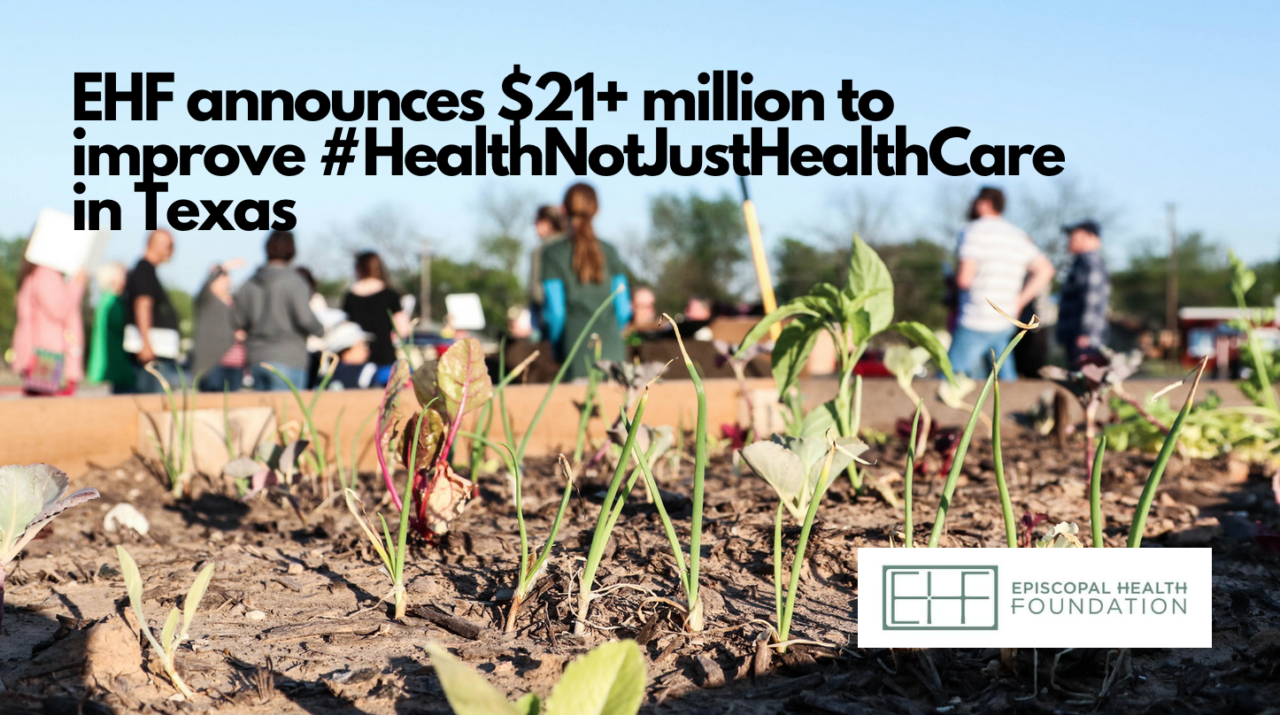
Episcopal Health Foundation (EHF) has invested more than $21 million in new grants that help community-based organizations and clinics address non-medical, social factors that impact health, while also providing crucial preventive health services to low-income families across Texas.
The investment is EHF’s largest single cycle of grants to date. An integral part of the foundation’s mission, the funding furthers EHF’s focus on improving #HealthNotJustHealthCare and strengthens organizations that help low-income Texans enroll in affordable health insurance or other health-related benefit programs.
“The many non-medical disparities that contribute to poor health can’t be fixed through medicine or hospital visits alone,” says Jo Carcedo, EHF’s VP for Grants. “These grants are aimed at shifting health system resources to tackle community factors like housing conditions, safe neighborhoods, healthy eating options, and other pieces that help shape the health of Texans.”
EHF’s $21+ million investment includes $3.9 million to help community clinics find new ways to address community factors that impact health and advocate for health insurance plans and government programs to help pay for it.
To further a focus on #HealthNotJustHealthCare across Texas, EHF is continuing investments to prepare clinics to shift toward payment models that are centered on prevention and the long-term value of overall care through the foundation’s Clinics Pathways Approach project. These new grants also include funding for clinics to continue working upstream to tackle community conditions through EHF’s Texas Community-Centered Health Homes (CCHH) initiative.
“Our bet is that if clinics provide comprehensive care, address patients’ social determinants of health, and engage in community prevention, then the financial resources currently used only for medical services could be redeployed to address non-medical factors that improve health outcomes for all patients and communities,” Carcedo said.
To continue building collaborative partnerships that focus on healthy living issues, EHF’s new investment provides an additional $755,000 to governments and nonprofits participating in EHF’s Texas Accountable Communities for Health Initiative (TACHI) across six Texas communities – Austin, Bastrop County, Brazos Valley, Houston’s greater northside, Gregg County, and Williamson County.
To help community-based clinics provide comprehensive care, more than $15 million will go to programs (including preventive care, primary care, dental care, specialty referrals, behavioral care, and telehealth services) that serve low-income populations. This funding also supports organizations that are expanding health insurance coverage and other kinds of health-related benefits for Texans with the least resources.
Finally, EHF is investing $3 million to continue the Bishop Dena A. Harrison Fellows Program at the Seminary of the Southwest. EHF created the program in 2015 to close the mental health gap in 12 rural counties across East Texas. By placing and funding seminary counseling graduates at local mental health agencies, the program provides mental health care to low-income families that previously waited weeks to receive this critical care.
###
For more information or to schedule an interview, please contact Brian Sasser, EHF’s chief communications officer, at 832-795-9404 or bsasser@episcopalhealth.org.
Complete list of EHF new grant recipients:
Outcome 1: Resource allocation and system reform in the health sector reflect the goal of health, not just health care
- $500,000 – Access Health in Fort Bend County (Clinics Pathway Approach)
- $600,000 – Central Health in Travis County
- $100,000 – City of Longview in Gregg County area (TACHI project)
- $57,441 – CommUnity Care in Austin (Clinics Pathway Approach)
- $650,000 – Community Health Network in Brazoria County (Texas Community Centered Health Homes Initiative)
- $100,000 – Dell Medical School at the University of Texas at Austin
- $455,467 – Go Austin/Vamos Austin in Travis County (TACHI project)
- $100,000 – Georgetown Health Foundation in Williamson County (TACHI project)
- $1,088,544 – Integral Care in Austin and Travis County
- $900,000 – Lone Star Circle of Care in Central Texas (Texas Community Centered Health Homes Initiative and Clinics Pathway Approach)
- $450,000 – Lone Star Family Health Center in Conroe (Texas Community Centered Health Homes Initiative)
- $100,000 – Northwest Assistance Ministries in Harris County
- $425,000 – Special Health Resources of Texas, Inc. in Gregg County (Texas Community Centered Health Homes Initiative)
- $1,000,000 – The Network of Behavioral Health Providers, Inc. in Harris County
- $100,000 – Texas A&M University System Health Science Center in Brazos County (TACHI project)
- $858,063 – United Way for Greater Austin
Outcome 2: Low-income and vulnerable populations access comprehensive care in communities
- $700,000 – Avenue 360 Health & Wellness in Houston
- $620,402 – Baylor College of Medicine Department of Pediatrics in Harris County
- $140,000 – Baylor College of Medicine’s Teen Health Clinic at Wisdom High School in Houston
- $231,500 – Burke Center in East Texas
- $300,000 – Children’s Defense Fund statewide
- $50,000 – Every Texan statewide
- $600,000 – ECHOS in Harris County
- $476,550 – Family Service Center of Galveston County
- $243,540 – Harris County Public Health
- $154,076 – HOPE Clinic in Houston (Clinics Pathway Approach)
- $300,000 – Houston Area Urban League
- $100,000 – Katy Christian Ministries in Houston area
- $240,000 – Light & Salt Association in Houston
- $401,370 – Mama Sana Vibrant Woman in Austin
- $350,000 – Matagorda Episcopal Health Outreach Program in Matagorda and Wharton counties
- $600,000 – Mental Health America of Greater Houston
- $469,600 – North Pasadena Community Outreach
- $290,574 – People’s Community Clinic in Austin (Clinics Pathway Approach)
- $625,000 – Planned Parenthood Gulf Coast in Houston
- $825,000 – Planned Parenthood of Greater Texas in Tyler and Waco
- $3,000,000 – Seminary of the Southwest program in East Texas
- $170,000 – Spring Branch Community Health Center in Harris, Galveston and Brazoria counties
- $85,000 – Texas Association of Community Health Centers statewide
- $750,000 – The Harris Center for Mental Health and IDD in Harris County
- $400,000 – The Rose in Greater Houston area
- $500,000 – The University of Texas Health Science Center at Houston
- $650,000 – Vecino Health Centers in Harris County
- $880,000 – Waco Family Medicine (Clinics Pathway Approach)